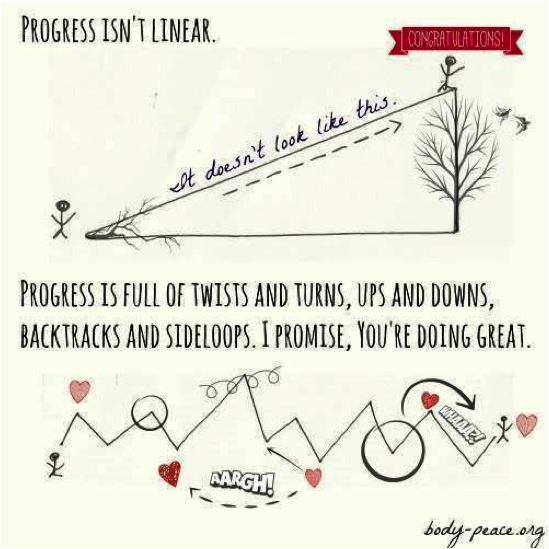By Donna Meredith-Dixon
As we wrap up this three part series, I thought again about something Judith Herman wrote in Trauma and Recovery. Trauma healing is only possible within healthy relationships and safe communities. In the Beyond Betrayal Community, you’ll experience both.
Progress Isn't Linear###
After reading Lisa’s post recommending a grief retreat, I was ready to jam my journal, nicely sharpened pencils, and a few changes of clothes into my overnight bag. Not because I haven’t chronicled my losses, mourning them alone or with others. No, I’ve done that. But as the body-peace.org graphic reminds us, our movement through the multidimensional partner trauma stages isn’t linear.

As a visual learner, graphics usually embed important concepts deep in my mind and soul. Reminding ourselves (and each other) that the twists and turns are normal experiences can help build resilience. Which leads us to Stage Three: Reconnection… integration…moving on.
Stage Three###
What’s happening in stage three? “The theme of this stage is of ‘radical acceptance,’ the end of resistance of the reality of the trauma, and a commitment to move forward in life with this reality integrated into the life narrative. It is a stage in which post-traumatic growth (PTG) is most likely to be observed, as the survivor begins to make the experience of trauma less foreground to her life, and looks for the recipes for making lemonade out of the lemon of trauma. Herman refers to this component of the process as the development of a ‘survivor mission,’ wherein the trauma survivor searches for ways to transform his experience in an empowering manner.
In this stage, trauma survivors create active engagements with their interpersonal and relational worlds, and come to experience themselves as more empowered and fully alive. They may try out new activities, new kinds of relationships, or new vocations.”
Stage Three Work###
As in the previous stages, there’s work to be done: rebuilding trust, developing a vision for the future, moving into any family of origin work, relationship and intimacy building, moving on, helping others.
What might partners feel, think or experience, or need?
- A range of intense and sometimes conflicting emotions.
- Our pre-discovery life feels like an abandoned town, a place we once lived
- We begin accepting our ‘new kind of normal’ life
- Trauma symptoms/triggers feel within manageable limits
- We regain appropriate levels of trust whether or not we remain in the marriage
- We consider new personal and professional goals
- We become positive, empowered and proactive—versus negative, overwhelmed and/or reactive.
- We are ready to actively engage outside what has become our safe place
- We experience a greater capacity/desire for healthy attachment/connection
- We overcome fear of intimacy
- We reconnect with God
In other words, in stage three we begin moving beyond being satisfied with seeing ourselves as survivors. We want to thrive.
Toward Thriving###
Along with completing tasks like regulating my emotions and managing triggers in stage one or grieving my losses in stage two, I also began casting off my identity as a victim. I adopted instead a survivor perspective. As a survivor, I relished a renewed feeling of confidence. While still experiencing triggers, loss, and fear, I could also access my resources and make healthy life choices. When asked how I was doing I would acknowledge I was coping and committed to the healing journey.
As I entered stage three, though, I began integrating betrayal trauma into my life story. I started taking control of my life, adapting to my new normal and reaching out. Surviving – living with a sense of just coping – was no longer enough. I began shedding the identity that once felt good and safe for that of a thriver.
Because I found safe people and a healing community, and did the hard work in stages one through three, accepting my own imperfections, and others', became easier. My life is rich in meaningful relationships. Like other thrivers, I can embrace new possibilities and, surprisingly, I rediscovered meaning and purpose. Sure, sometimes I still encounter symptoms of betrayal trauma. But I quickly turn to the people, tools and practices I've learned in the journey and to the God who held me throughout. Through His lens, I see beautiful things.
Lisa adds: I'm hoping to be dancing to this one with Donna next month at the IACSAS conference in Colorado (it's one of her favorites).


